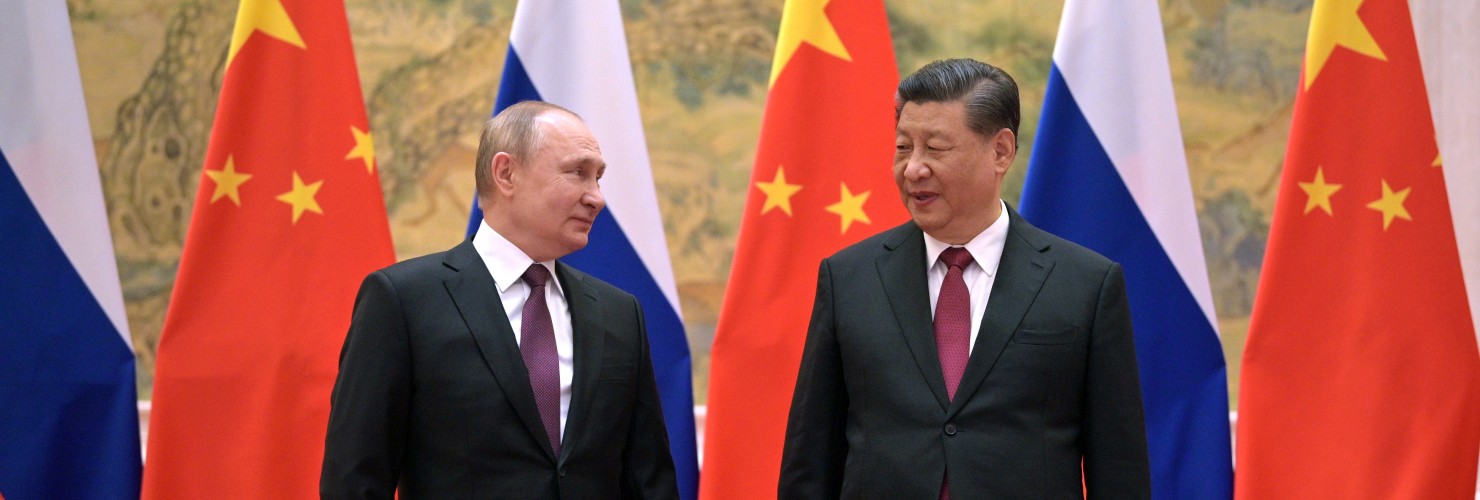

Ukraine and Taiwan: two conflict zones with destabilizing potential
As presidents Putin and Xi meet against the background of the Olympic games, the crises centered on Ukraine and Taiwan continue to smolder. These two crises share striking similarities, but they are also connected in more subtle ways, argues Hanns W. Maull. While circumstances surrounding the conflict zones differ fundamentally, each could destabilize not only the security order of a whole region but, ultimately, also international peace and security.
There is an uncanny resemblance between the crises over the future of Ukraine and that of Taiwan. Each finds itself in a geopolitically exposed and precarious position, close to an overwhelmingly powerful country that sees them as part of their own territory or exclusive sphere of interest.
Both Ukraine and Taiwan consider themselves liberal democracies and thus implicitly challenge the legitimacy of the authoritarian regime of Russian President Vladimir Putin, on the one hand, and the neo-totalitarian rule of the Chinese Communist Party under Chairman Xi Jinping, on the other. Each therefore is perceived by the proximate great power’s leadership as a threat to its political control, and each has been the target of a broad spectrum of military, cyber and subversive attacks aimed at destabilizing and, ultimately, overturning the present, pro-Western, political orders.
Both countries are uncomfortably close to their hostile neighboring superpower - Ukraine shares long borders with Russia, while Taiwan and China are separated by a 180km wide maritime divide. For both Ukraine and Taiwan, the United States is their most important security partner, yet neither enjoys an alliance with the world’s greatest military power.
The Ukraine has been offered a membership in NATO at some uncertain point in the future. But Russia, having occupied the Crimea and supporting secessionist movements in Eastern Ukraine, de facto holds a veto over any formal integration of Ukraine into NATO, since membership requires the absence of any external conflict involvement as a condition. Washington has also made it clear that it would not militarily intervene even if Russia were to attack Ukraine (though it already has begun late last year to supply Ukraine’s armed forces with weapons).
Taiwan lost its status as a military ally of the United States in 1978, when Washington opened diplomatic relations with the PRC, but the US Congress made the support of its former ally into a central national security issue by passing the Taiwan Relations Act (TRA) in 1979, which obliges the government to “enable Taiwan to maintain a sufficient self-defence capability”. The TRA has been the foundation of America’s policy of “strategic ambiguity”, which is aimed at protecting the status quo in the Taiwan Strait by discouraging both mainland China and Taiwan from taking any unilateral steps that would undermine it. The TRA has been the foundation of America’s policy of “strategic ambiguity” that aims to protect the status quo in the Taiwan Strait by discouraging both mainland China and Taiwan from any unilateral steps to undermine it.
Similarities and interconnections
Ultimately, the security of Ukraine and Taiwan rests on two major pillars: their inner resilience and capacity to resist the pressure from Russia or China, whichever form it may take, and the credibility of US promises to support them - with the help of its allies – in upholding their independence.
At this point, it becomes clear that the two hot spots not only resemble each other, they are intertwined: what happens in one theater will affect the other. Both Moscow and Beijing are watching carefully to see how Washington responds to the challenges posed by the other. Any escalation of tensions in one of the hot spots will focus US attention and resources on that crisis, creating temptations for the other “all-weather friend” to exploit perceived opportunities. Russia and China might even tacitly co-ordinate their strategies to force America and the West into a two-crisis conundrum.
Ever closer relations
The responses of Russia and China to each other’s military expansionism will also have a profound bearing on the future of their partnership. During the crisis over Russia’s annexation of the Crimea, Beijing provided extensive verbal support but little actual assistance. China´s biggest contribution to Russia’s economy, a USD 400 billion natural gas deal signed in May 2014, shortly after the Russian invasion, had a clause that obliged Russia to finance the “Power of Siberia” pipeline by itself. Furthermore, Chinese banks largely complied with Western sanctions against Russia.
Since then, relations between Russia and China have become much closer, as shown by a significant increase not only in foreign policy co-ordination, for example in the UN Security Council, but also in bilateral trade: Russia’s exports to China rose from USD 42 billion in 2014 to USD 57 billion in 2020, now making up four percent of Russia's GDP. The visit of Vladimir Putin to demonstrate his support for China and its controversial Olympic games in Beijing underlines how close this alignment has become. Indeed, the two countries describe each other as a “comprehensive strategic partner of coordination for a new era” – in a partnership that is now said to be “unprecedentedly” close.
High stakes on all sides
But the question remains, if Russia escalated its attacks on Ukraine, would China openly support Moscow - risking deepening tensions with the West, solidifying NATO’s revival and pushing forward the alliance’s new focus on China? Or would China, again, try to keep its distance, and thus risk damaging its rapprochement with Russia?
Behind the immediate stakes in those two intertwined crises looms a larger battle over the future of the international order: will it remain an order that retains liberal democratic principles and some rule of law, or will it become an order shaped by superior military power and domestic repression? The leaders in Russia and China like to present the Western political model as a decadent failure and boast of their own, superior governance performance at home and abroad. Yet it is obvious in the case of Russia’s authoritarian model of governance, and quite possibly also in the case of China’s, that they are each, in their own ways, as deficient as those of the West.
The contest over the future of the global order will therefore not be decided by the respective performances of China, Russia or the West, but by their ability to reinvent their capacity of governance - not only at home but also internationally, to face the looming global challenges. Which political system will be better in adapting to the requirements of our times?
That issue also lies at the core of the struggle over the future of both Ukraine and Taiwan. Here, however, there are two fundamental differences between those two hotspots. First, while Taiwan’s economic transition and democratic transformation have been firmly consolidated, Ukraine’s transition is still very much under way. This makes Ukraine much more vulnerable than Taiwan. Second, any unilateral change of the status quo in Ukraine would represent a severe challenge but might not overthrow the pan-European security order. In the case of Taiwan, however, such a change would topple not only the regional security order in East Asia but also undermine the very foundations of global order.

